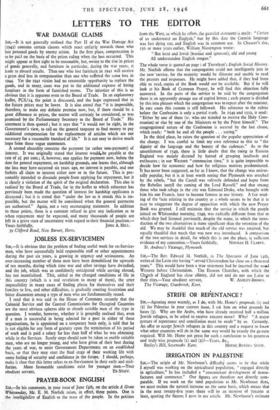PRAYER-BOOK ENGLISH
SIR,—In his comments, in your issue of June f4th, on the article A Great Whitsunday, Mr. E M. Norfolk raises, in effecf, three points. One is the intelligibility of English to the mass of the people. In the petition from the West, to which he refers, the guarded statement is made : " Certen of us understand no Englysh," but by this date the Cornish language was fast dying out, and English was in common use. In Chaucer's day, 15o or more years earlier, William Nassyngton wrote:
" But lerid and lewid (lcaried and ignorant), old and young All understanden English tongue."
The whole verse is quoted on page i of Trevelyan's English Social History. Mr. Norfolk affirms that the congregation could not intelligently join in the new service, for the majority would be illiterate and unable to read the prayers and responses. He might have added that, if they had been able to read, copies of the Book would not be available. But if he will look at his Book of Common Prayer, he will find this objection fully answered. In the parts of the service to be said by the congregation there is an apparently strange use of capital letters ; each prayer is divided by this into phrases which the congregation was to repeat after the minister. In rare cases this custom is still followed. His reference to the rubric before the Confession is only a partial truth. In 1549 and 1552, it read: "Either' by one of them (sc. who.are minded to receive the Holy Com- munion) or else by one of the Ministers or by the Priest himself." The congregational nature of the Confession is secured by the last clause, which reads: " both he and all the people .. . saying."
In the third place, he raises the question of the popular appreciation of the change. I was careful to limit my own reference to this to " the dignity of the language and the beauty of the cadences." As to the unsettlement of 1549, there is little doubt that the rising in Eastern England was mainly dictated by hatred of grasping landlords and enclosures ; in our Western " comrnocion time," it is quite impossible to decide how far economic and how far religious motives predominated. It has never been suggested, so far as I know, that the change was univer- sally popular, but it is at least worth noting that Plymouth was attacked by the rebels, "but the Casten was valiantly defended and kepte from the Rebelles tintyll the coming of the Lord Russell," and that among those who took refuge in the city was Edmund Drake, who brought with him his son Francis, later to become famous in our history. A fair read- ing of the facts relating to the country as a whole seems to be that it is easy to exaggerate the degree of opposition with which the new Prayer Book was greeted. I still maintain that the service in which the people joined on Whitsunday morning, 1549, was radically different from that to which they had listened previously, despite the name, in which the intro- duction of the two alternatives is more significant than the retention of the old. We may be thankful that much of the old service was retained, but equally thankful that much that was new was introduced. A comparison of the two services in detail, for which this is not the place, is sufficient evidence of my contention.—Yours faithfully, NORMAN H. CLARKE. St. Andrew's Vicarage, Plymouth.






























 Previous page
Previous page